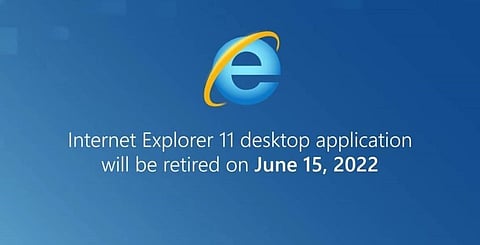

WASHINGTON: It's time to bid adieu to Microsoft's oldest browser, Internet Explorer (IE). After 27 years of service, the app will finally retire on June 15, 2022.
In May last year, an announcement on Microsoft's website stated that Internet Explorer will be rendered inoperable from June 15, 2022, on certain versions of Windows 10. It then urged customers to switch to Microsoft Edge, stating it "provides support for legacy and modern websites and apps."
Now, as of June 15, the IE desktop app will be disabled, and users will be redirected to Microsoft Edge. Don't worry if this is news to you: Microsoft has an FAQ section guiding IE users through the transition. From guides to video tutorials, the company looks like it is going all out in promoting its cross-platform browser Edge.
A long service
Internet Explorer was first released in 1995 as an add-on package for Windows 95. Its launch signalled the beginning of the end of Navigator, the first widely popular browser, Netscape Navigator. Microsoft went on to tie IE and its ubiquitous Windows operating system together so tightly that many people simply used it by default instead of Navigator.
Later, the company began providing the IE browser for free as part of the package.
The Justice Department sued Microsoft in 1997, saying it violated an earlier consent decree by requiring computer makers to use its browser as a condition of using Windows.
It eventually agreed to settle the antitrust battle in 2002 over its use of its Windows monopoly to squash competitors. It also tangled with European regulators who said that tying Internet Explorer to Windows gave it an unfair advantage over rivals such as Mozilla’s Firefox, Opera and Google’s Chrome.
In 2003, the browser reached a peak of 95 per cent usage, but it was unable to maintain its position, and the user base began to decline dramatically.
Many competitors entered the browser market and began offering better user interfaces, faster internet speeds, and smoother performance. It appears that Internet Explorer was unable to keep up with the competition, and it has gradually devolved into nothing more than a default explorer used to install other browsers.
Microsoft halted new browser feature development in 2016, and this may be the first time the tech giant has decided to phase out Internet Explorer.
Today, the Chrome browser dominates with roughly a 65% share of the worldwide browser market, followed by Apple’s Safari with 19%, according to internet analytics company Statcounter. IE's heir, Edge, lags with about 4%, just ahead of Firefox.
WATCH |
Welcoming the new
Sean Lyndersay, the Microsoft Edge program manager was quoted as saying by Mashable, that "the future of Internet Explorer on Windows 10 lies in Microsoft Edge". In a Microsoft blog on May 2021, Lyndersay says, "Microsoft Edge has Internet Explorer mode (“IE mode”) built-in, so you can access those legacy Internet Explorer-based websites and applications straight from Microsoft Edge."
"Not only is Microsoft Edge a quicker, more secure, and more contemporary browsing experience than Internet Explorer, but it also addresses a crucial concern: compatibility for older, legacy websites and applications," he added further.
The company's blog release also suggests how one can find the Edge browser. "The good news: you probably already have it (Edge) on your device. Search for 'Microsoft Edge' using the Windows 10 search box or look for the icon. If you don’t have it, you can easily download it here." It added that once a user moves to Edge, "it’s easy to bring over your passwords, favorites and other browsing data from Internet Explorer in a few clicks."
Twitter reacts to news:
Nostalgia-ridden netizens, as usual, took to Twitter to share their reactions to the news. Here are a few of them:
There are some tongue-in-cheek reactions happening, too.
(With inputs from AP and ANI)